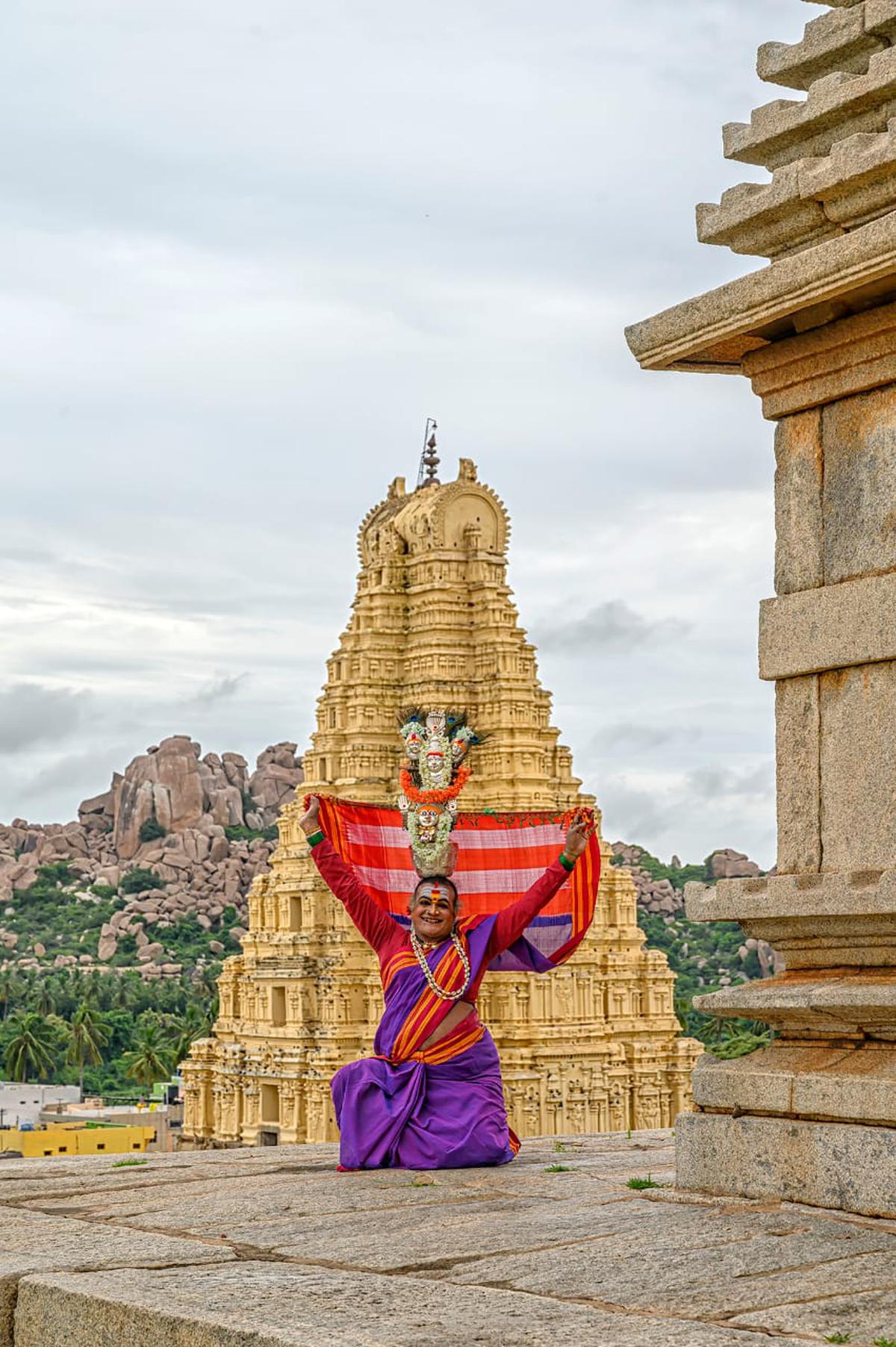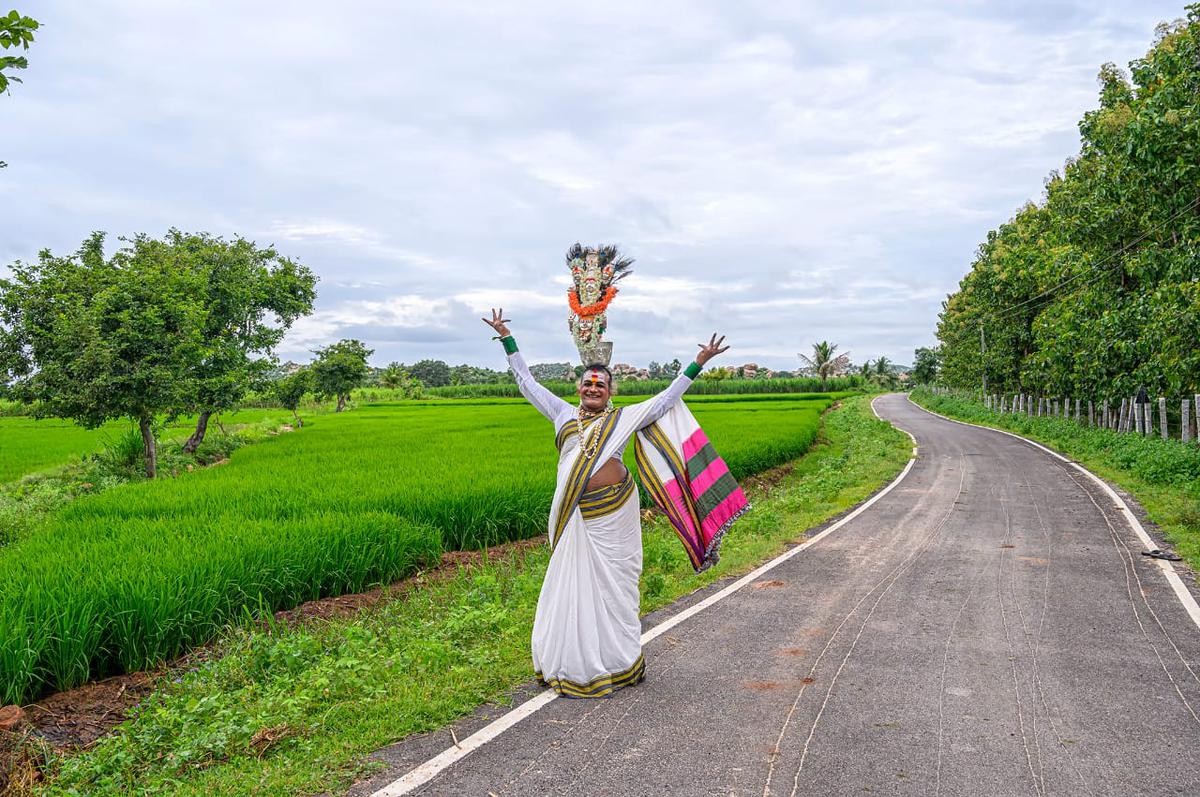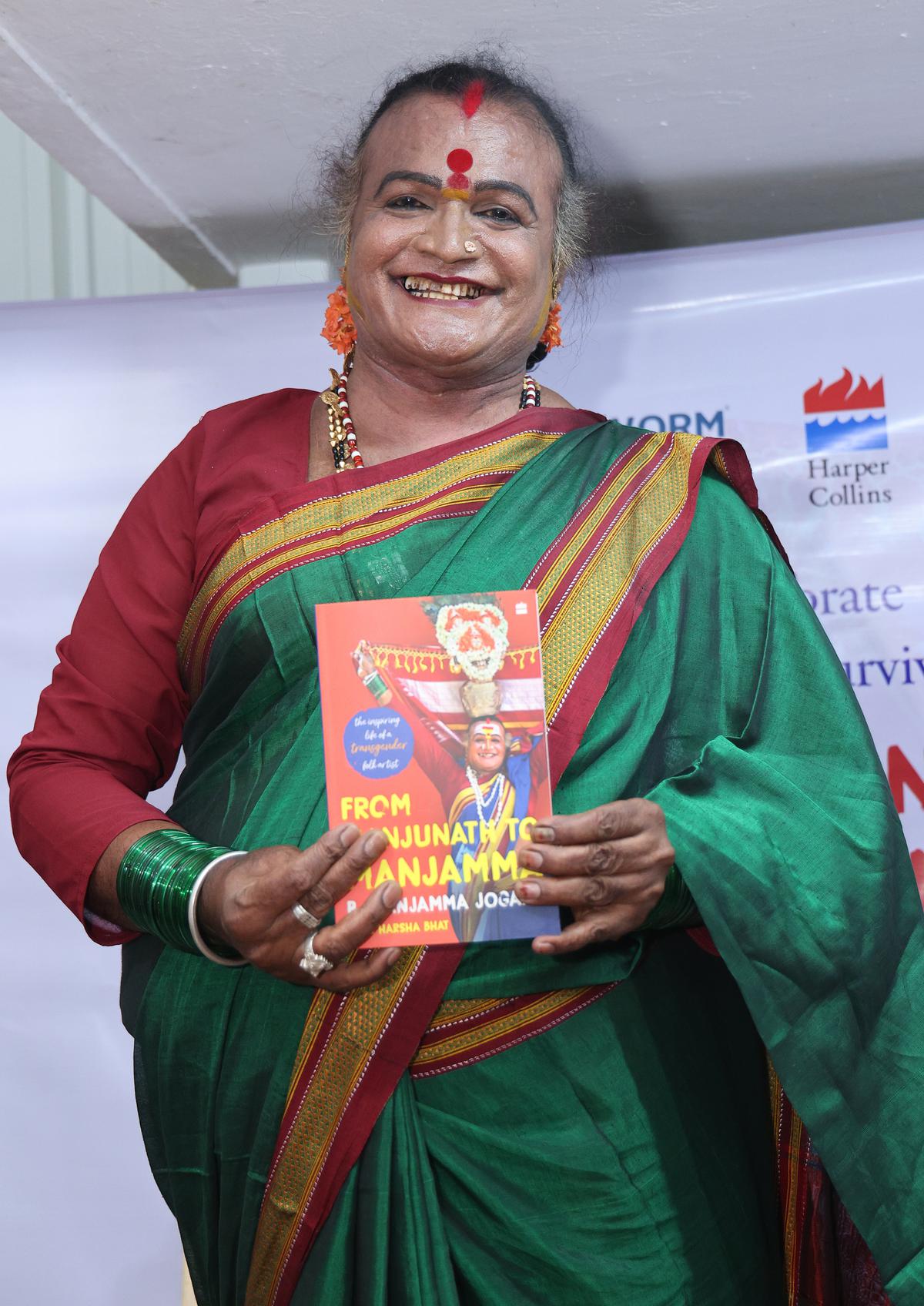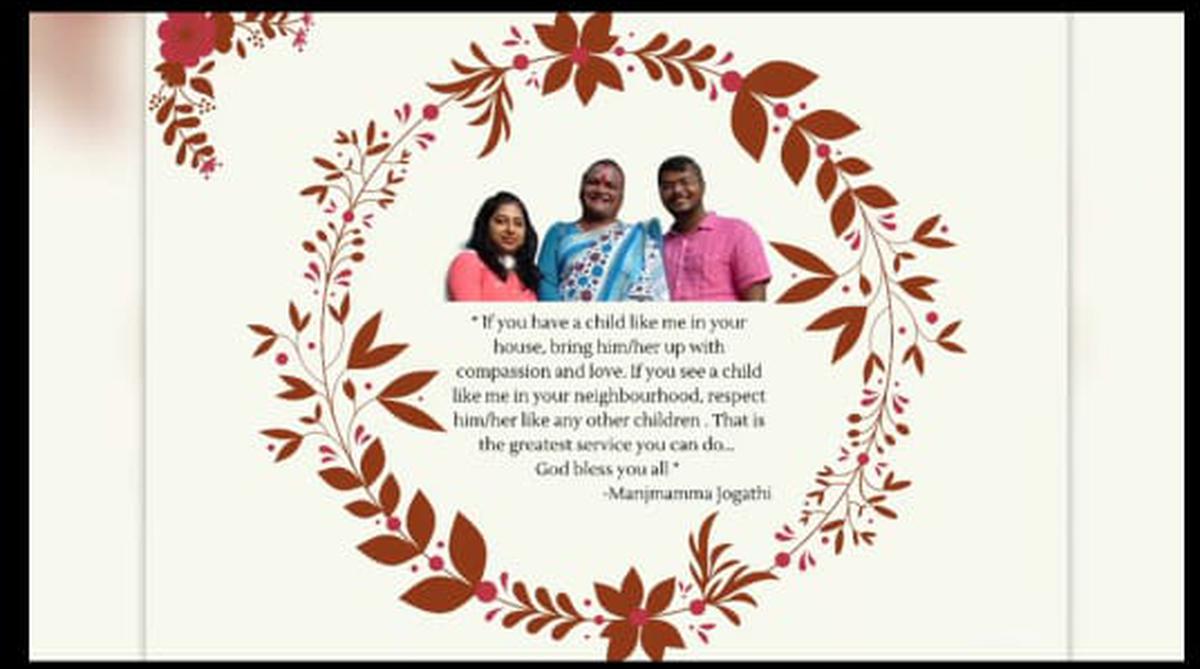When I visit Manjamma Jogathi, former president of the Karnataka Janapada Academy, she introduces me to her “god-given son” B.K Vikram, his parents and son. “The baby’s mother, Ramya, is at work,” she says, beaming at a full-of-beans toddler Trilok. She informs me casually that Vikram and she connected on Facebook a few years ago. Vikram is a poet and Ramya an engineer. “Our mother-son relationship is of the spirit, not of blood,” she says, her face lighting up in a smile.
Manjamma Jogathi was born Manjunath in a body that was at odds with itself and the world. As a seventh class student in rural Karnataka, the only time Manjunath knew unabashed joy was when he wore his female classmate’s langa-jacket (long skirt and blouse) and danced on stage to Kannada film songs.

Jogathi Nritya gave Manjamma an identity beyond her gender
| Photo Credit:
Special Arrangement
For this, Manjunath was beaten up and severely ridiculed. His attempts to help with housework were thwarted by his father. His mother, having borne 21 children (of which few survived), was initially happy to have some help, but when she noticed Manju’s proclivity towards dressing like a woman, she too objected.
At that time, neither parent nor adolescent Manju knew that their domestic conflict would grow into decades of systemic abuse. Manjunath would be hunted down, thrashed, humiliated, shunned and molested. He would cry, attempt suicide and spend many nights wishing he’d never heard from the woman within. Manjunath would fashion a lifetime of pain into a platform on which he would dance and own his identity as Manjamma Jogathi.
Matha Manjamma Jogathi or Amma (as she’s now affectionately addressed) is a renowned folk artiste, actor and advocate for trans-women, who face social exclusion despite being sought after for their “auspiciousness.” Playing the Chowdki and Shruti (twin instruments believed to have been created by goddess Yellamma) Jogathis dedicate their lives to telling Yellamma’s stories. Yellammanaata would once be all-night plays, recalls Manjamma, though now they even do half-hour performances as people cannot immerse in complex mythology.

Manjamma Jogathi and her journey of hope and happiness
| Photo Credit:
Special Arrangement
Recounting the events when she was thrown out of home at age 21, Manjamma speaks of her parents with much empathy. Even after taking a loan and getting her “dedicated” (a practice that was later banned), her family could not accept her feminine nature. Her uncle, Gandhi Mama, pushed against her feminine orientation despite being a Jogathi. The despair she felt from being reviled in her own home led her to drink poison — an act that further alienated the family. “Where will Manju go?” asked the village elder, who was consulted after she recovered. “Let him go and do whatever his community does to survive. He cannot be with us anymore,” Manjamma heard her father say. Even her mother did not ask where she would go as she left home with a sari and blouse in a bag.
Hanging by every thread of support she got, living in public spaces and on charity, Manjamma made idlis, taught students and somehow found a mentor when she witnessed a folk dance being performed in a bus stand. “Guru Basappa taught me the Jogathi Nritya and made me dance in crowded bus stands,” recounts Manjamma. She didn’t receive a single rupee for her efforts but she expresses eternal gratitude to him for teaching her an art-form that would save her life and give her a voice. She later met Guru Kalavva Jogathi, who trained her in Yellammanaata and enabled her to take Jogathi Nritya to the proscenium stage.

Manjamma at the launch of her autobiography recently in Bengaluru
| Photo Credit:
Special Arrangement
Manjamma Jogathi describes the second time she seriously considered suicide as a life-changing experience. After being molested by multiple men in a dark alley, she lay in bed — broken and in pain. “I thought if I lie down on the railway track, I will be cut into pieces and no one can put me back together.” A softer voice within firmly nudged her to live. That night, she broke the spell of self-harm by drinking a jug of water, she recounts in her autobiography, From Manjunath to Manjamma, that she has co-authored with Harsha Bhat. “I would like to tell my community members this: no one will come and recognise you. You have to recognise yourself. Embrace all that you are. God is not in the temple. God is in what you do — if you are sweeping the floor, sweep it well. Put all of yourself into what you do,” she says.
As the first trans-woman to be appointed president of the Karanataka Janapada Academy, Manjamma didn’t just set about training trans-women in Jogathi Nritya, she opened the form to everyone, stressing that this would sustain the form and bring respect to Jogathis. Undeterred by opposition (and resignation of office) from eminent literary figures at the Janapada Academy on her appointment as president, she won appreciation from the Registrar and colleagues across hierarchies.
It was while washing a white sari petticoat that she needed to repeat during a training camp in a remote village that Manjamma received news of the Padma Shri. She dismissed it as a prank call. Soon, the announcement became very real. She was on the national stage. She took her first flight (and a photo with the pilot). She would go viral on social media for taking drishti for the President of India. She would become exasperated with bucket-less bathrooms in posh hotels and openly express exhaustion over all the media attention. Manjamma Jogathi was recently in Bengaluru attending to engagements as an artiste, a community advocate and a motivational speaker. “This being Pride Month, I have been busier,” she says.

The ‘Samaanatheya Seemantha’ (baby shower of equality) invite
| Photo Credit:
Special Arrangement
She proudly recounts how her son Vikram deeply internalised the essence of her words at public and corporate sensitisation events. When she went to their seemantha (traditional baby shower), she saw that Ramya and Vikram had put up a banner promising unconditional acceptance of their unborn child, irrespective of gender by birth and choice. “They actually took a public oath to this effect with full support from their respective parents,” she says.
Calling this a “Samaanatheya Seemantha” (a seemantha of equality), they inspired couples in other states when they posted about it on Twitter, she adds. At the corporate sensitisation event she had led that morning, most hands went up when she asked who all would be willing to follow this act of inclusion and acceptance. Trilok the toddler, meanwhile, is curious about everything in the room that his visiting grandmother occupies. When his mother, Ramya, strums Manjamma Jogathi’s Shruti, however, all his energy is diverted into a little dance that encapsulates the joy of just being.
Stay connected with us on social media platform for instant update click here to join our Twitter, & Facebook
We are now on Telegram. Click here to join our channel (@TechiUpdate) and stay updated with the latest Technology headlines.
For all the latest Entertainment News Click Here
For the latest news and updates, follow us on Google News.
